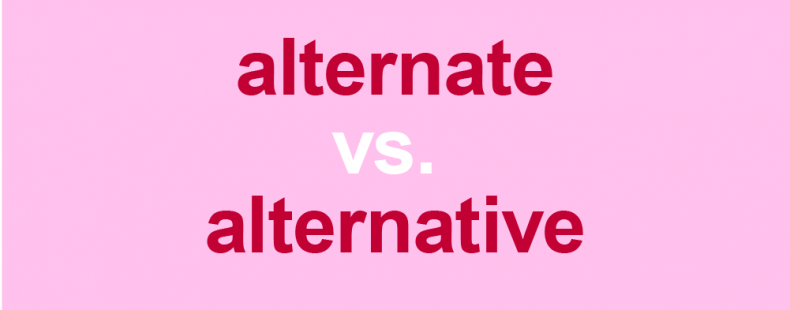Whether you’re on a football team or a juror, there’s a chance you might not be the first choice. But if you don’t make the initial cut, yet are still on the B list, are you an alternate? Or does being a backup make you an alternative?
Is there actually a difference between alternative and alternate, or are they just synonyms? Let’s take a closer look.
What does alternate mean?
When used as a verb without an object, alternate means to take turns or go back and forth, or “to interchange repeatedly and regularly with one another in time or place; rotate.” For example: Each week, she has her kids alternate who is in charge of walking the dog. Or, The weather alternates between pouring rain and scorching sun with little warning.
When used with an object, alternate as a verb can be defined as “to do in succession, one after another,” or “to interchange regularly.” For example, For his new diet, he alternates juicing with cleansing every other week. Or, the doctor recommended she alternate Advil and something stronger to help keep the pain in check after surgery.
As an adjective, alternate means “being in a constant state of succession or rotation; interchanged repeatedly one for another.” It can also refer to something that’s mutual or every second one of a series. For example, only the alternate lines in the script were highlighted.
Alternate can also be defined as “constituting an alternative” when used as an adjective. For example, the alternate plan may have seemed less exciting at first, but they ended up having a blast after the original trip was canceled.
Alternate’s first recorded use was in 1505–15 and it derives from the Latin word altern?re (“do one thing and then another”). Synonyms for alternate include backup, double, equivalent, fill-in, proxy, replacement, stand-in, sub, and surrogate.
What does alternative mean?
As a noun, alternative is defined as “a choice limited to one of two or more possibilities, as of things, propositions, or courses of action, the selection of which precludes any other possibility.” For example, Those who aren’t comfortable with flying have the alternative of taking the train, bus, or driving.
Alternative can also refer to “one of those options or courses of action to be chosen.” For example, Driving is the alternative that I’m most comfortable with at this time.
Alternative as an adjective can mean “affording a choice of two or more things, propositions, or courses of action.” It can also refer to when those two options are mutually exclusive, so that if one is chosen, the other must be rejected: His alternative choice was to turn down the scholarship and find a full-time job instead of going to college. Lastly, alternative as an adjective can be used for something that is nontraditional or unconventional. For example, their alternative lifestyle allows for an open marriage that works for them.
Alternative’s first recorded use was in 1580–90 and it originates from a combination of alternate and -ive. Synonyms for alternative include different, second, substitute, surrogate, another, backup, flip side, and other side.
How to use each word
Although alternative derives from alternate, and they both date back to the 1500s, these two words aren’t completely synonymous and can’t always be interchanged. Although both can refer to a different or backup option, typically alternate refers to an action of rotating or taking turns while alternative usually refers to another option or choice.
For example:
- Each year, their family vacation alternates between the beach and Disney World.
- For a family vacation that’s more affordable than Disney World, the beach is a fun alternative.
You will also use alternative, and not alternate, for something that falls outside of the mainstream. For example: His passion for alternative music inspired him to learn to play electric guitar.
However, these two can overlap as an adjective when it comes to referring to a back up or mutually exclusive option.
For example:
- Instead of driving on the highway, she prefers the longer but more scenic alternate route.
- Thanks to all of the traffic, the scenic route was actually a much faster alternative than taking the highway today.
A worthy alternative to reading about alternative is figuring out if hero and protagonist can be alternated.
Or watch to find out the difference between charming and charismatic below.
WATCH: When To Use "Charismatic" Vs. "Charming"














